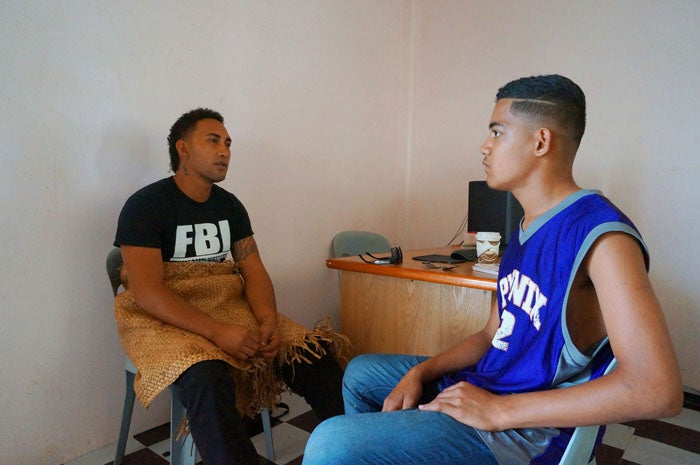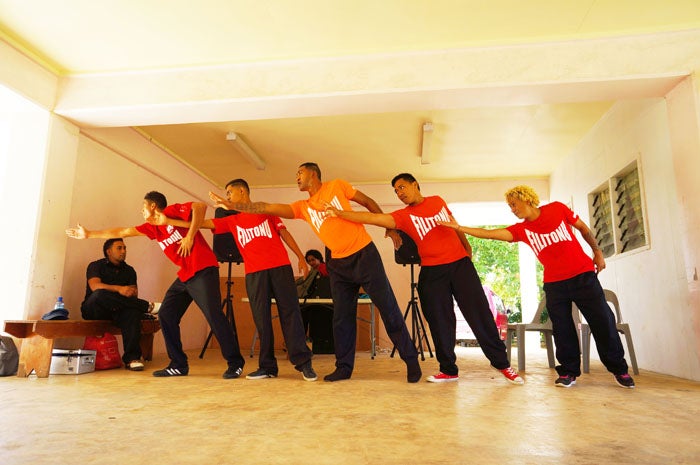IF it was up to Tevita Moala, he would probably be dabbling in the finance market or teaching but the 31-year-old did not allow circumstances that forced him to drop out of school to negate his belief in himself.
The former Tonga College student began attending Atenisi Institute which offers an alternative method of teaching based on the premise that students should be taught "how" to think and not "what" to think.

"My parents were divorced and my grandparents were looking after me. Eventually they could not afford to continue sending me to school so I had to drop out although I had really wanted to finish my studies properly," Mr Moala said.
"However I believed in myself, I knew that I had something good in me. I knew that although I did not make it academically, that I was still smart enough to do something with my life."
When Mr Moala was still in Atenisi in 2002, he watched a performance by Fili Tonu - a youth drama group based within the Tonga Family Health Association - which implements the United Nations Population Fund, UNFPA-supported Y-SRHR (Sexual and Reproductive Health Rights) program. The program is also supported by the Government of New Zealand.
The performance led Mr Moala to Fili Tonu - loosely translated to mean "making the right choice" - and sealed his plans post-Atenisi but it would take another year to actually really get into the concepts behind using drama for awareness-raising on sexual and reproductive health and rights.
"I had to leave school and I thought I couldn't leave Fili Tonu too and the best thing about it was I enjoyed what I did. Without the group I wouldn't have known that I had this talent for acting. I can sing and dance but for me it's the acting, the skits, that's my passion," Mr Moala said.
"There are challenges, yes, but we keep it real and simple. The kids are OK and they are open to these messaging but the conservatism is still a big challenge. We do what we can."
Fili Tonu has been a popular platform for messaging though just one of the many avenues Tonga Family Health uses. Mr Moala speaks of performance evaluations and interactions post-performance to ensure the messages were indeed getting through.
"I think drama is a very good platform, it is the best. We organise fun nights every Friday for young people, both in the urban centre and in the rural area," Mr Moala said.

Kathy Mafi has been working in the sexual and reproductive health and rights arena for more than 15 years as the program manager at Tonga Family Health Association. One of the programs she's been overseeing is the Y-SRHR.
Association executive director Amelia Hoponoa, Ms Mafi and the team have been part of national processes that have contributed to social changes, particularly in relation to youth and sexual and reproductive health and rights.
The association was very much behind Tonga's first mock Youth Parliament which led to the establishment of a Youth Division within the Ministry of Internal Affairs.
Laudable as well is the establishment of 14 youth-friendly spaces in schools across Tonga. Private schools, mainly Catholic-owned, agreed to be pilot schools and two state schools are now considering joining the program.
"The idea is to have a space where young people can comfortably and privately meet school counsellors or the district nurses on the days they are in that particular school," Ms Hoponoa said.
"Sometimes police go to these schools to speak to certain students and to have a separate place where they can have these meetings works out for everyone involved."
The school-based youth-friendly spaces is a separate activity under the Y-SHRH program from the distribution drop-in centres. A booth for information dissemination is also featuring at the current week-long inter-collegiate sports.
From the association headquarters in the heart of Nukualofa, services are readily accessible though specifics include ante-clinics on Tuesdays, sexually-transmitted infections on Wednesdays, pap-smears on Thursdays and Friday is for youth.
Community outreach during which time Fili Tonu performs the most and workplace visits are also popular activities by the association. The association also does media outreach through talk-back shows or regular programs.
Ms Mafi says while the younger people are quite receptive to the sexual and reproductive health and rights messaging to a certain extent, attitudes of service providers may have to be scrutinised.
"I have been doing this for a long time and I reckon we have to stop underestimating people at grassroots level. They know what we're talking about and language does not have to be a barrier to discussing sexual and reproductive health and rights issues," Ms Mafi said.
Back to Mr Moala, on Thursday he led his group during a performance at the Psychological Ward, Vaiola Hospital in Nuku'alofa, Tonga's main referral hospital.
He returns to Fili Tonu after a five-year break.
"It was a hard decision because I really loved what I was doing staying home," he said. And what was he doing at home? Being dad to his two boys - a four-year-old and a 10-month-old.
"I missed Fili Tonu though and I am glad I am back. This is a new group of boys I am working with and I am enjoying it already so much. We are working well in spreading the message of good relationships, self-esteem, the importance of communication - you know, life-skills!"
Tonga's population according to the 2011 census is 103,252; its annual population growth rate is 0.3 per cent.
The fertility rate of Tonga which is the average number of children per woman is 3.9. In the Pacific, the highest TFR is Tokelau and Samoa with 4.7 and the lowest is Palau at 2.2.
The adolescent fertility rate which is the number of births per 1000 women aged 15-19 years in Tonga is 30 per 1000 women. Highest AFR is RMI at 85, followed by Nauru at 81, Vanuatu at 66, PNG at 65, Solomon Islands at 62, and Kiribati at 49. The lowest AFR is Niue at 17.
Life expectancy or the average number of years one is expected to live in Tonga is 69.3 for men and 73.1 for women. Life expectancy is an important indicator to measure the wellbeing and health of a population. The highest in the Pacific is 74 for men and 80 for women in the Cook Islands and the lowest is 54 for men and 55 for women in Papua New Guinea.



